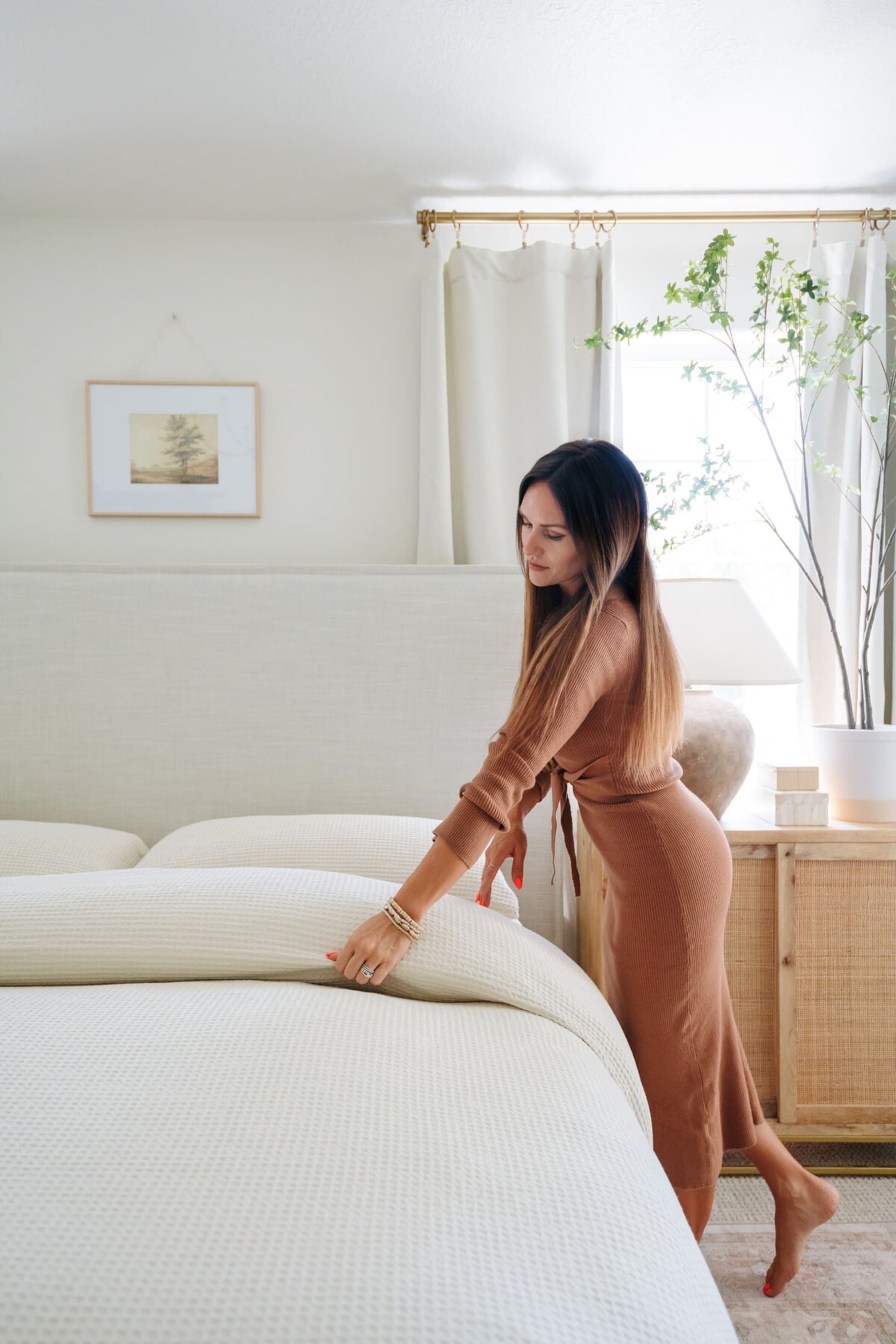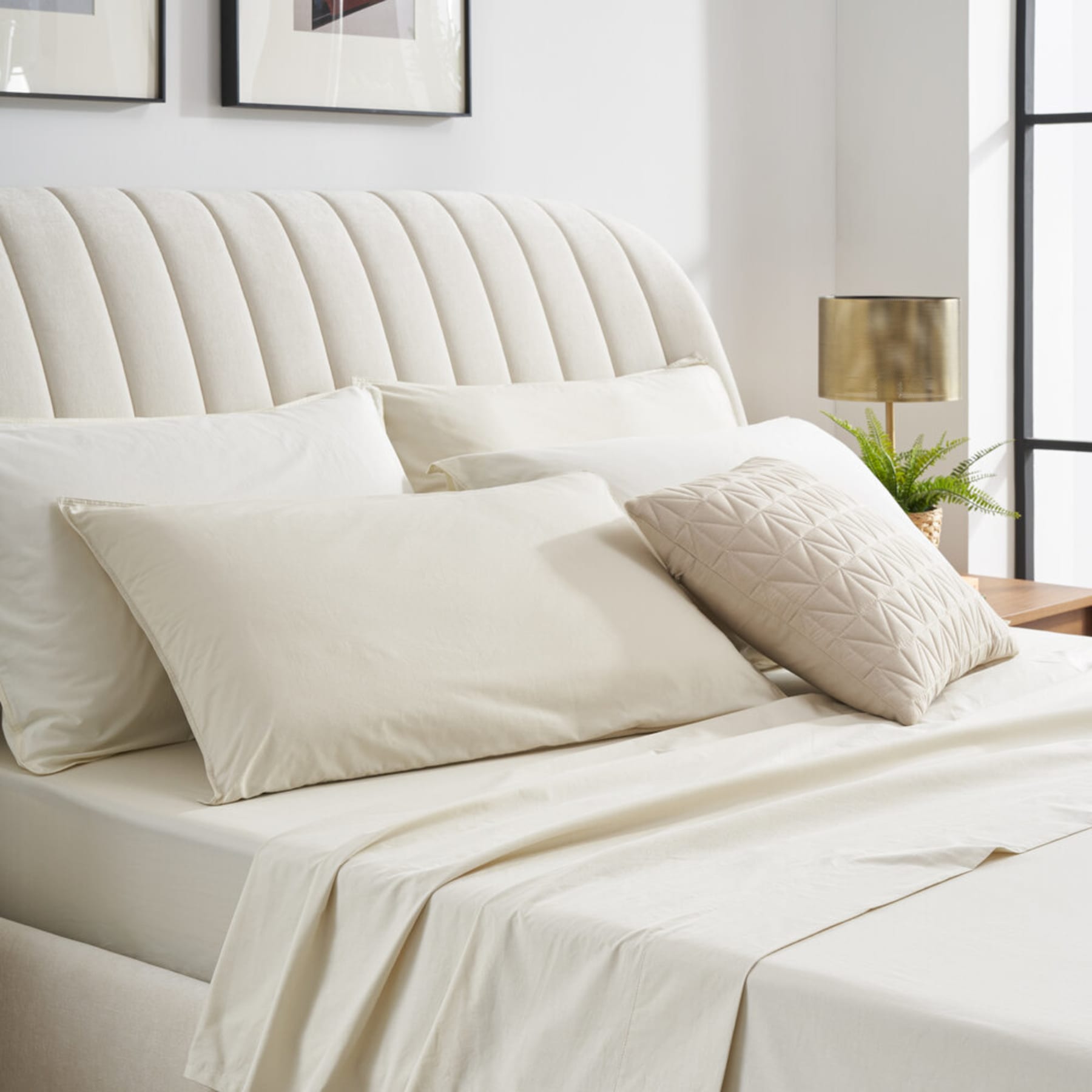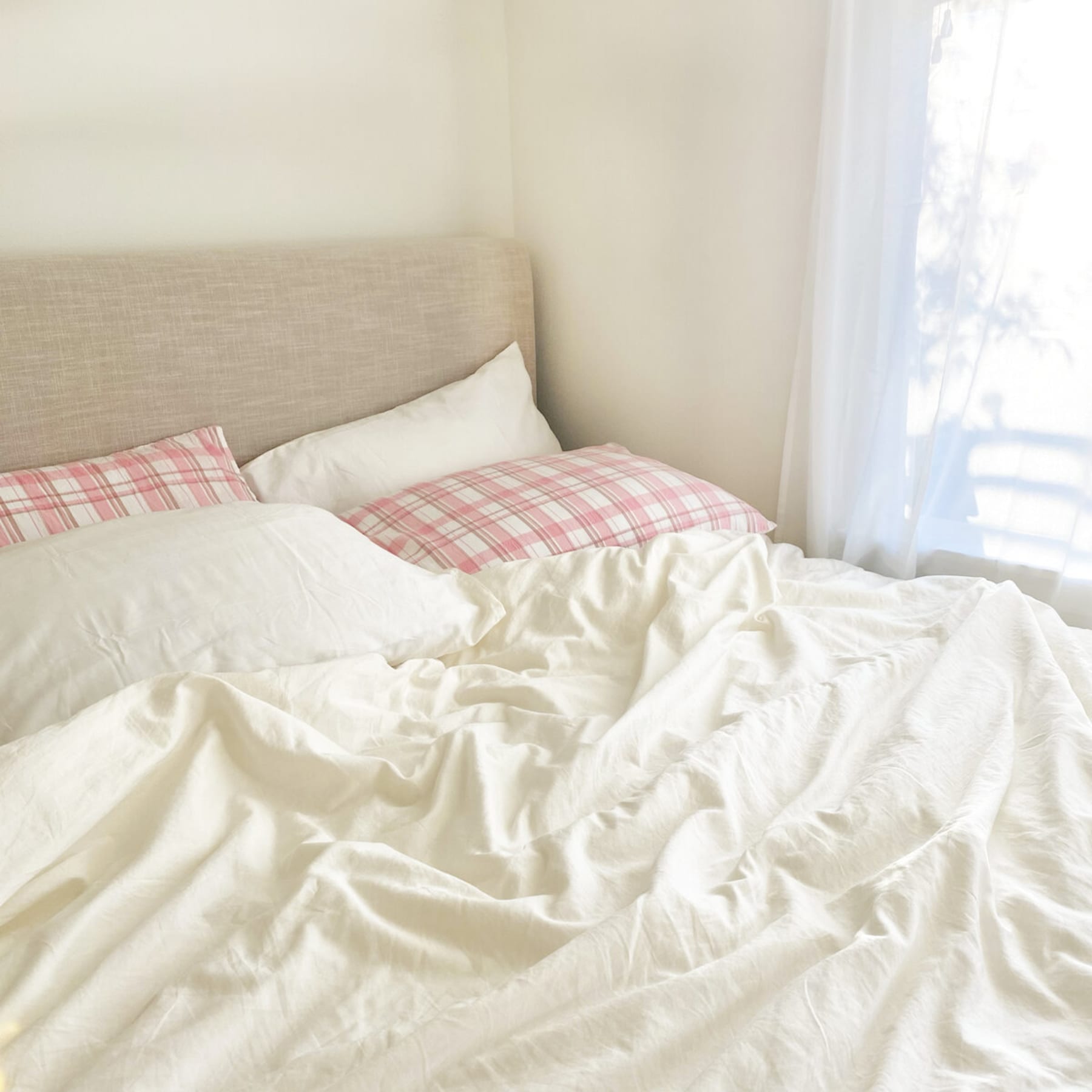
13 Types of Bed Sheets and Which Material is the Best
When it comes to a good night's sleep, comfortable bedding is just as important as a supportive bed. But with so many types of bed sheets available out there, it can be overwhelming to choose the right one.
From cotton to silk to bamboo, each material has unique qualities that make them suitable for different needs and preferences. In this article, we explore 13 types of bed sheets and determine which material is best for you.
Best overall bed sheets
1. Cotton bed sheets
Cotton is the most popular bed sheet material and for good reason. It's breathable, soft, and durable, making it perfect for year-round use and all climates. It also softens up after multiple washes while remaining durable.

Our Waffle Duvet Set is made from 100% cotton. Picture credits: @designlovesdetail
The quality of regular cotton sheets can vary widely depending on the type of cotton used, the thread count, and the manufacturing process. Because of its availability, cotton sheets are typically more affordable than high-end cotton sheets like Egyptian or Supima cotton.
Cotton sheets are easy to care for and can be machine washed and dried. But, they may require ironing to maintain a crisp and smooth appearance.
2. Microfiber bed sheets
Microfiber is a synthetic material made from ultra-thin fibers. This refers to the extremely fine fibers that are used to make the fabric, which can be as much as 100 times finer than human hair. Microfiber is made from a blend of synthetic fibers, typically polyester or a combination of polyester and nylon.
Microfiber bed sheets are soft, lightweight, and wrinkle-resistant, making them ideal for busy households. However, microfiber bed sheets are not as breathable as cotton, which may not be suitable for hot sleepers. Additionally, some people may find that microfiber sheets are more prone to pilling, which can make them look worn over time.
Best cooling bed sheets
If you’re a hot sleeper or you’re feeling the effects of the warm Summer weather, you’d want to invest in a bed sheet that helps regulate airflow or is generally more cooling.
3. Percale bed sheets
Percale is a type of cotton weave that creates a crisp, cool, and highly breathable fabric. Percale bed sheets are known for their durability and the fact that they get softer with each wash. They have a matte finish and a thread count of at least 180, although many percale sheets have a thread count of 200 or higher.

The Percale Sheet Set in Wheat consists of a fitted sheet, a flat sheet, and 2 pillowcases. Also pictured: The Lexi Tufted Bed.
Percale sheets are considered the best sheets for those who sleep hot or live in warmer climates. The tight weave of the fabric allows air to circulate freely, keeping you cool and comfortable all night long. They are also lightweight, which adds to their breathability.
To add on, Percale is easy to care for and can be machine washed and dried.
4. Supima cotton bed sheets
Supima cotton is a high-quality type of cotton that is grown in the United States. It is known for its long staple fibers, which make it stronger, softer, and more durable than regular cotton.
Supima cotton sheets are also highly breathable and have a silky smooth feel to them. Due to their high thread count, they are typically more expensive than regular cotton sheets, but offer great quality and comfort.
They are ideal for year-round use but are especially suitable for warmer months because of their breathability.
5. Bamboo bed sheets
Bamboo sheets are made from bamboo fibers, which are a sustainable and eco-friendly alternative to conventional cotton. Bamboo is a fast-growing and renewable resource that requires less water and pesticides to grow than conventional cotton.
Bamboo fibers are naturally silky and smooth, which creates a luxurious and comfortable feel. They are also naturally hypoallergenic and antimicrobial, which makes them a good choice for those with sensitive skin or allergies. As they are very breathable and lightweight, bamboo sheets are ideal for warm climates or hot sleepers.
But because bamboo sheets are made from natural fibers, they may require more care than synthetic materials like microfiber. They are typically machine washable, but should be washed on a gentle cycle and dried on low heat to avoid shrinking or damage to the fibers.
6. Egyptian cotton sheets
Egyptian cotton is prized for its luxurious softness, durability, and breathability. It is high-quality cotton that is grown in Egypt, and it has long staple cotton fibers that create a smooth feel to the fabric. These fibers are thinner and longer than regular cotton fibers, which makes them stronger and softer.
Egyptian cotton sheets also have a high thread count, which further contributes to their softness and durability. A thread count of at least 400 is common for Egyptian cotton sheets, but some premium brands offer thread counts as high as 1000.
Egyptian cotton sheets are also highly breathable, which makes them perfect for warmer climates. They are typically more expensive compared to any other bed sheets, but they offer exceptional comfort and quality.
7. Linen bed sheets
Linen is a natural material made from flax fibers. Linen bed sheets are lightweight, breathable, and moisture-wicking, making them perfect for summer months and hot sleepers.
They have a unique texture that becomes softer with each wash, which means that they will continue to improve over time. Furthermore, as linen fibers are very strong and resistant to wear and tear, this means they can last for many years with proper care.
On the downside, linen sheets tend to wrinkle easily, which means that they may require regular ironing to maintain a neat and crisp appearance.
8. Tencel bed sheets
Tencel sheets are processed using an environmentally friendly method known as lyocell. Tencel is actually a brand name for lyocell and is known for its eco-friendliness.
As the production process for Tencel fibers uses less water and energy than traditional cotton production, this makes it a popular choice for the environmentally conscious.
Made from the wood pulp of eucalyptus trees, Tencel sheets are very smooth and silky to the touch, which makes them extremely comfortable to sleep on. They are also highly breathable and moisture-wicking, which helps to regulate body temperature and keep you cool throughout the warm summer nights.
Tencel sheets are very durable and resistant to wrinkles and shrinkage. They are easy to care for and can be machine washed and dried, which makes them a convenient choice for busy households.
9. Silk bed sheets
Silk sheets are made from the natural fibers produced by silkworms and are known for their luxurious appearance.
Not only do they look smooth, but silk sheets are extremely breathable and help regulate body temperature, making them the perfect cooling bed sheet for warm weather. Silk fibers are very strong and resistant to wear and tear, which means that silk sheets can last for many years. They are also naturally hypoallergenic and repel dust mites, which makes them a good choice for those with sensitive skin.
However, as the production of silk is a labor-intensive and costly process, silk sheets are typically more expensive than other types of sheets (except Egyptian), making them less accessible for some.
Best warm bed sheets
As the temperatures drop and the winter season sets in, it's important to stay warm in your bed. Not all sheets mentioned above are good for the cold weather, so let’s dive into the best warm bed sheets that are good for trapping heat and insulating your body.
10. Sateen bed sheets
Sateen sheets are made using a satin weave, which creates a soft glossy finish to the fabric and is naturally wrinkle-resistant. The weave is characterized by a higher number of threads on the surface, which gives the fabric a silky feel to them. Sateen sheets are an ideal option for those who want a luxurious and elegant bedroom but don’t want to invest in Egyptian cotton or silk sheets.

The Sateen Duvet and Sheet Set in Cloud. Picture credits: @annikasleaf
These sheets are typically thicker than regular cotton sheets, which makes them more durable and long-lasting. This makes them well-suited for colder months because they provide warmth and coziness. Furthermore, sateen sheets can withstand frequent washing and use without losing their softness or sheen.
11. Jersey
Jersey bed sheets are made from a type of knit fabric that is typically used for T-shirts or other casual clothing. They are made from a blend of cotton and synthetic fibers, such as polyester or rayon, which makes them stretchy and very comfortable to sleep on.
They are also highly durable and easy to care for, as they are often machine-washable and can be tumble-dried on low heat.
Jersey sheets are less breathable than other types of sheets, such as cotton or linen, hence they are better at trapping heat which makes them good for winter months.
12. Flannel bed sheets
Flannel is a soft and cozy material that is perfect for cold winter nights. Flannel bed sheets are made from cotton fibers that have been brushed to create a fuzzy and slightly wooly texture. They are also heavier and thicker, making them extra warm and insulating, perfect for cold climates.
Flannel sheets are also a good choice for those who want a low-maintenance bedding option. They are typically easy to care for and can often be machine washed and dried without any special instructions. They also tend to be more durable than other types of cotton sheets, and can withstand frequent washing and use without losing their softness.
13. Fleece bed sheets
Another popular option for the cold weather is fleece. Fleece bed sheets are typically made from polyester fibers that are woven together to create a fluffy, plush fabric that is similar in texture to wool. Due to the thickness, they create a warm sleeping environment which is perfect for winter.
Similar to flannel sheets, fleece bed sheets are easy to care for. They are usually machine washable and dryable, and can often be laundered without any special instructions or treatments.
What is the best material for bed sheets?
Unfortunately, there’s no straightforward answer to this. Whether you prefer the softness and breathability of cotton, the eco-friendliness of bamboo, or the warmth and coziness of fleece, there is a bed sheet material that will meet your needs perfectly.
We hope that this list has helped you narrow down your options and help you in choosing the right bed sheets that can make all the difference in getting a comfortable sleep. With so many options available, you're sure to find the perfect bed sheets to help you sleep soundly and comfortably all year round.
FAQs
What is a thread count?
Thread count refers to fabric density and tells you the number of yarn threads in a square inch of fabric. It’s measured by counting the number of vertical warp threads and horizontal weft threads contained in the material.
For a more in-depth explanation, check out this article: Best Thread Count for Bedding
How often should I wash my bed sheets?
It is generally recommended to wash your bed sheets once a week to maintain good hygiene and prevent the buildup of dirt, sweat, and dead skin cells. However, some people may need to wash their sheets more frequently, depending on factors such as personal hygiene, activity level, and health conditions.
If you sweat heavily at night, or if you have allergies or respiratory issues, you may need to wash your sheets more frequently to prevent the buildup of allergens and bacteria. Additionally, if you share your bed with pets or young children, you may need to wash your sheets more often to remove pet dander or spills. It is also recommended to wash your sheets in hot water to kill bacteria and dust mites.